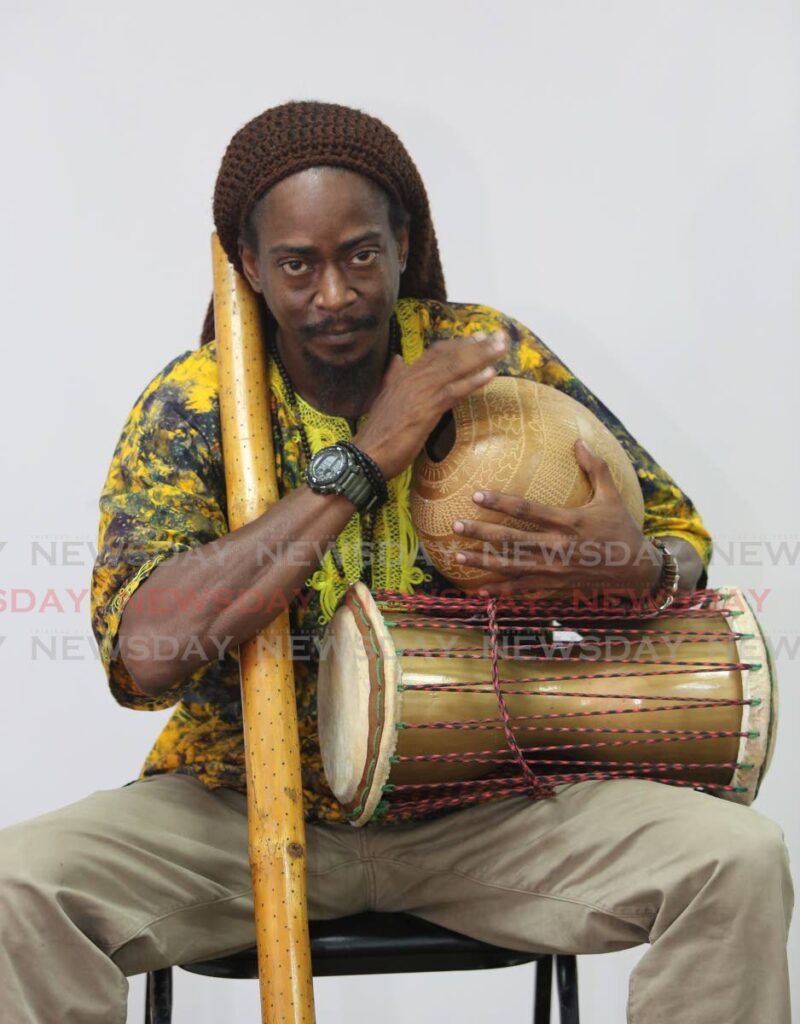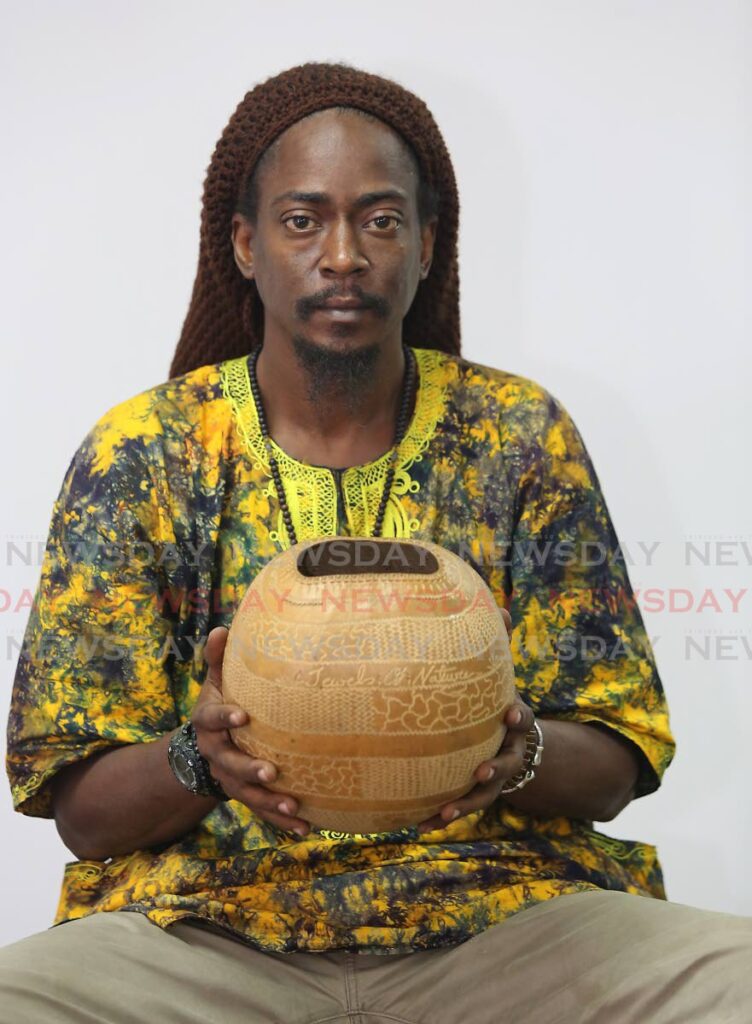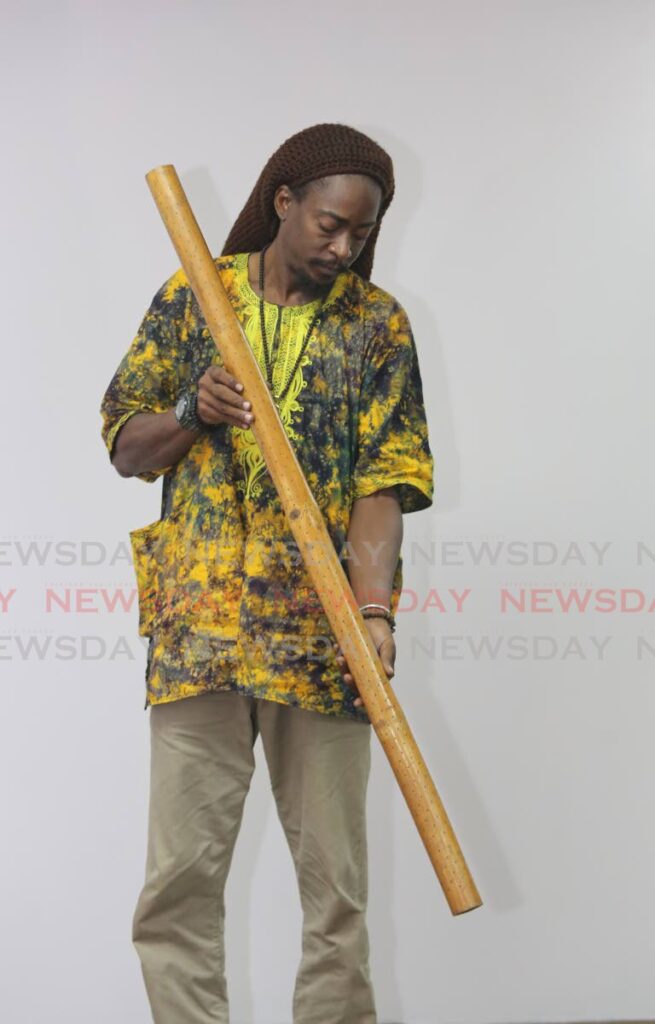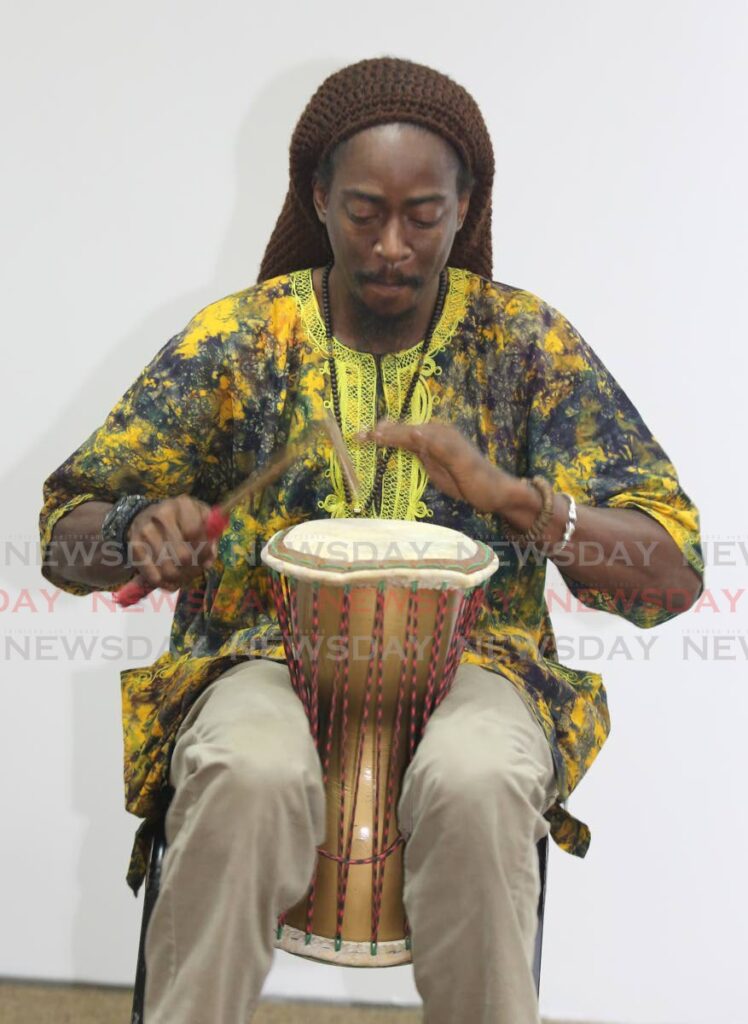Nature's music: Jajah Onilu's sons build on his organic artform

The natural movement is a lifestyle that was promoted by well-known master percussionist and instrument-maker the late Jajah Oga Onilu, and is being carried on by his sons Baba Ayinde Onilu and Modupe Onilu.
Sunday Newsday spoke to Baba Ayinde Onilu, 42, who explained that Baba is a name of Yoruba origin given to him by his father. It means "father" and he is a father to a 14-year-old daughter.
Onilu is an organic percussionist, but also a teacher, farmer, artist, and designer, along with Modupe, in their clothing and jewellery business, Vyombo Designs.
He makes and plays instruments and makes jewellery and craft items using natural materials such as coconut, bamboo, and calabash.
“Organic instruments are what my father would term as 'first music.' Nature is the first musician. It produced all these natural raw materials, sounds, tones, and vibes that we as human beings, when we immerse in it, feel the energy it gives us.
 Baba Ayinde Onilu with a bowlie drum made from a calabash. Photo by Sureash Cholai
Baba Ayinde Onilu with a bowlie drum made from a calabash. Photo by Sureash Cholai
“Now we’re living in a time where we’re disconnected from the natural, even the respect and reverence we should give to nature as our sustainer.
"So organic percussion deals with mimicking a lot of these sounds and bringing it into these modern times where man has disconnected from that vibrational tone of music.”
So not only does he make instruments with mostly organic materials, but many of them produce the sounds of nature. For example, the rain stick, made from bamboo, sounds like rain falling or running water, while the icaba bird, a whistle made from calabash, can make the sounds of birdcalls.
Other aspects of organic music are the promotion of healthy eating, self-care, and cultural transformation, as well as environmental preservation. Onilu said hopefully, hearing the music brings back that consciousness in people's minds.
He lamented the lack of patriotism and respect for nature as people would recycle or not litter when they visit another country. But in TT they do not care about their carbon footprint, and “set up” the country’s future generations.
He said his father removed himself from the limelight, immersed himself in nature, and nature revealed the music and instruments to him. He initiated the “natural movement” and contributed a lot from a cultural perspective and Onilu and his brother are carrying on that legacy.
He said they were born into the natural movement and were lucky to experience the arts, including the performing arts, from a young age, so they both enjoy them, and the legacy is no burden.

“My father played an integral part in me being who I am and teaching me a lot about the things I should value, hold on to, cherish and pass on to future generations.”
While his daughter is not into instruments, he is proud that she enjoys literature, songwriting, poetry and drama.
“I think it’s probably a genetic thing. She’s not much into the instruments, but she’s naturally inclined with rhythm, which is what I think happened with me and my brother too.
“We inherited a vibes from our father and that permeates our lifestyle and the things we do and promote. It’s about self-consciousness. And the more you know yourself, the more you’re connected to your destiny and purpose.”
Onilu said he lives in modern times, so he would not go to live in the bush but he finds himself wanting to spend time in nature, to find comfort and to recharge.
He pointed out that some people work so much they do not have the time to connect to nature and, unless they have plants in or around their homes, everything around them is dead.
Also, he said, with Wifi, Bluetooth and other “frequencies corrupting the natural frequencies,” it can be difficult to connect to the higher senses like intuition, telepathy and clairvoyance.

With his organic instruments, Onilu plays the doption beat, which is based on the concept of the breath being the first drum.
The sound is very similar to beatboxing.
“We in TT have a rich history based on the slave trade and the banning of the drum. With the innovation of the Africans, they moved the drums to the mouth. From there they moved it to the bamboo – tamboo bamboo, which manifested into the biscuit tin and then to the steel drum.”
Because he uses organic instruments to produce that doption beat, he creates a different “tonal vibration and energy” with his band Dayo Bejide.
He explained that Dayo Bejide came out of Jewels of Nature his original band with his father and brother. When their father died in 2011, the brothers created the new band, combining organic music with conventional instruments, producing a combination of tribal, jazz, island and kaiso music.
The name, he said, means "happiness has come in the rainy season." The concept of the name comes from their belief that, in a time where popular music is on a “low vibrational frequency,” especially in the lyrics, the band’s music is refreshing and replenishing, like rain.
They hope the positive music will help people face the adversities of the world.
Onilu added that he and his brother are in the process of registering an NGO called the Jajah Onilu Legacy Project, honouring and protecting their father’s legacy. Based in the Caura Valley, they are planning several projects for farming and a cultural space where people could learn to make and play organic instruments.
In addition, he has a children’s project called Make and Play where he immerses children, between five and 17, in nature. He shows them where and how plants grow, as well as how to harvest and prepare them to make instruments.
He said he wants to get Make and Play into schools, as well as to expand it in the Legacy Project.
“It’s a medium I use in most of my workshops. It’s not just about playing music. It also has to do with the invocation of creativity. The creative spirit is something we need to enhance and promote, especially in our younger generation.
“Creativity does not only manifest in making an art or craft. You could learn how to think creatively so whatever endeavour the child decides to go into, they could invoke creativity whenever necessary to be innovative and different.”
He works with private organisations hosting summer camps and does some community development work. He also does some work with the National Institute of Higher Education, Research, Science and Technology (NIHERST); and the Export Centres Co Ltd as facilitator in its natural resources and raw material module.
To those who would like to get into the arts in TT, Onilu said it could be difficult to sustain themselves by doing what they loved, because many people in TT do not revere art.
“It kinda hard to reach a certain level but now that’s changing because of technology and social media.
"It’s all about how you market yourself, the quality of your product and things like that. Now, it’s all up to you to make your craft lucrative.”

Comments
"Nature’s music: Jajah Onilu’s sons build on his organic artform"